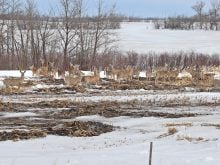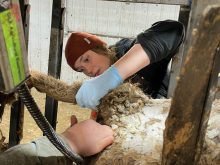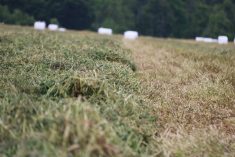If trying to make a living in the cattle business feels like banging your head against a wall, maybe it’s time to seek professional help.
With the Sustainable Grazing Mentorship Program recently launched by the Manitoba Forage Council, practical, hands-on advice from active producers who have learned how to make intensive grazing work is now only a phone call away.
For a $100 fee, a producer can pick the brains of elite pasture managers from their own area.
Mentors spend 16 hours, or roughly two days, assisting ranchers interested in incorporating new practices aimed at improving forage and livestock production, as well as help with farm planning, water management and fencing technology.
Read Also

Feds propose overhaul of chronic wasting disease control program
Chronic Wasting disease control program getting updated by Canadian Food Inspection Agency with feedback encouraged from producers.
“First, they pay their 100 bucks, then the mentor will give them a call and get some background information from them,” said Rodger Sheldon, a specialist with Manitoba Agriculture, who is involved in administering the program.
Mentors will then download satellite and aerial photographs to get a look at their client’s land base and grazing system.
“The mentor will then use those maps to sit down with the producer and take a look at the weak links and strong points in their system and see what opportunities there are to improve it,” said Sheldon.
Mentors will attend a two-day training school in early August. Some of them are past winners of the Manitoba Grazing School’s Graziers of the Year competition, which is awarded each December at Brandon’s Keystone Centre.
Studies have shown that better forage and livestock management practices result in higher production at a lower cost, improved drought tolerance and environmental sustainability. Higher stocking rates and improved livestock carrying capacity translate into better weight gain and higher milk production per acre.
The Sustainable Grazing Mentorship Program is a Canadian Cattlemen’s Association initiative funded by Agriculture Canada.
In Manitoba, the program is administered by the Manitoba Forage Council with additional support from Manitoba Agriculture.
Grant Lastiwka, a former pasture specialist with Alberta Agriculture who now serves as a forage program manager with the Agricultural Research and Extension Council of Alberta, said the 18 mentors in Alberta’s program have helped nearly 200 ranchers since it was formed in 2003.
The Alberta program pays mentors $500 plus expenses for 16 hours of consultation.
“It was sort of the brainchild of a few people who sat down and asked, ‘how did we learn about grazing management? What holes are there as people are going ahead trying to adopt applied and controlled grazing? As they run into hurdles, what do you think needs to be addressed?’ “
Ulla Thomsen, of Ponoka, Alta., has been grazing cattle for 60 years, first on her family’s farm in Denmark, then later on the Canadian Prairies. In 1990, she began using intensive grazing methods to extend her 500 acre ranch’s grazing season and put more pounds on custom grassers.
Thomsen said the most satisfying part of being a mentor is the knowledge that she has helped struggling producers make their operations profitable.
“For a farmer, if something works for you, then you want to spread the good news,” she said. “It made my farm profitable at a time when it was difficult on a small mixed farm. I raised four kids and got them all through university.”
In farm communities, the pressure against individuals interested in trying new things is often formidable, she said, recalling one client who faced that.
“All her in-laws told her that she should hay this, tear up that. They also told her that she shouldn’t be farming because she’s a widow.”
Thomsen suggested that she try intensive grazing first on one quarter of land as an experiment.
“When I came back in June, she was so excited. She said, ‘I can’t believe it. There’s grass all over,’ ” said Thomsen. “She didn’t have to tear up the fields. Now her in-laws are just green in the face because she’s successful.”














